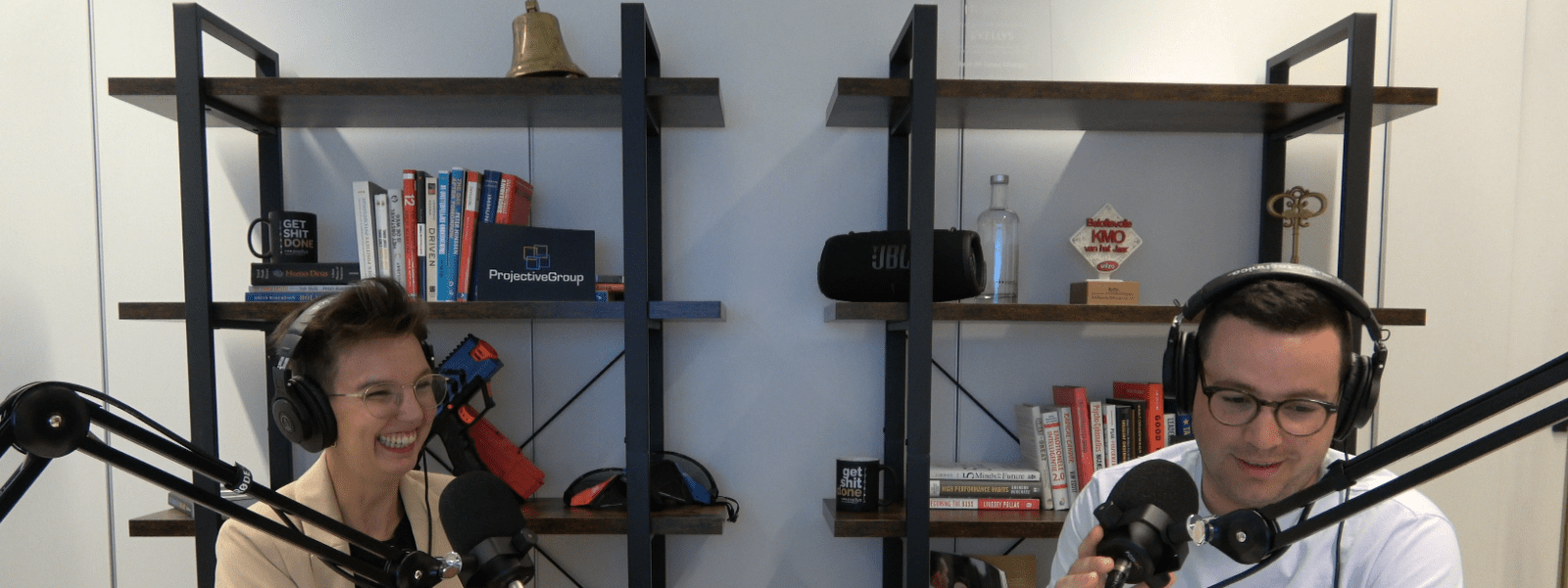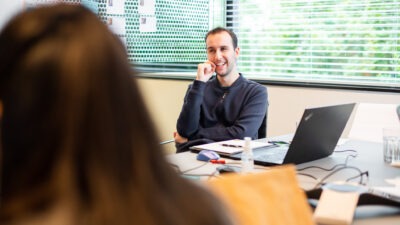Podcast: “Our brain is not a storage unit”
on 29 October 2023 for GraduatesThis is an episode full of firsts. For the first time, we have someone behind the mic who used to be a colleague, but is now a training partner. This episode, we’re not going to dive into someone’s personal story, but rather give you concrete tips and tricks to make you more productive and calmer at the same time. And for the first time, we’re doing this blog not as a translated, written account of the conversation, but mainly as an informative piece listing the gist of what you need to know about time management and productivity. If you’re intrigued and want to learn more, we invite you to listen or watch the full podcast episode below.
Let’s meet our guest, Ellen Vandevyvere.
- Founder of The Time Hub
- Digital Productivity Expert
- Former Talent Scout for the Exellys recruitment team
- 30-something mom of a toddler
Ellen has always had the entrepreneurial gene.
“My very first concept was to help students take the first steps towards living on their own. There is so much information thrown at you at that stage: what do I need to know about my heating system? What do I need to take care of in terms of insurance? And so on… I wanted to make that step easier,” says Ellen. “When I was working at Exellys, I realised that what I had always been passionate about was productivity. For example, when I started my first job, I would immediately google 10 ways to better manage my inbox. I was always the person who would go hard, go fast, and keep going. Until finally, a few years ago, I hit a wall. I was always busy, like many people these days. My weeks were packed, my weekends were packed, I had a demanding job that I loved and a lot to do at home. So I realised that it’s nice to go fast, but you also need to slow down from time to time. That’s how the idea for The Time Hub came about.”
Part 1: Focus.
“Focus is something that is often lacking, both at work and at home. I think it’s important to point out that it’s actually quite normal not to be able to concentrate, because our brains are not wired that way. In prehistoric times, if we were fully focused on preparing our meals, we wouldn’t notice the lion approaching to have us for dinner. So our brains have developed a kind of personal assistant that is constantly on the lookout for distractions in our environment. Today, those predators have been replaced by notifications.”

So how do we make sure we can focus on our most important tasks with minimal distraction?
1. Track how your energy flows throughout the day.
A good exercise is to track how you feel at each time of the day for a week or two. Are you the kind of person who needs 5 cups of coffee before someone can talk to you? Or can you dive straight into deep work? Do you have a dip in energy after lunch? Track how you feel to find out when you’re most focused and/or productive.
2. Protect the times when you are most focused for optimal productivity.
Ellen is most productive between 8 and 10 in the morning so those hours are sacred to her. No one can book a meeting with her before 10, she is not available for calls, and everybody knows this. “In those few hours I might get three times as much work done as the rest of the day. It’s that time that makes me feel fulfilled when my work day is over. I know that my most important tasks are done, so it doesn’t really matter what I do the rest of the day,” says Ellen.
3. Avoid or minimise distractions during these times.
To protect this focus time, it’s important to eliminate distractions. Ellen’s tips: “Communicate with people and let them know not to disturb you during this time. Turn off notifications on your phone or computer. Put on noise-cancelling headphones or isolate yourself. Work from home if it helps, or if you’re like me and you’re more easily distracted at home, go to a coworking space where there’s nothing to do but work.”
4. Don’t be afraid to ‘have the talk’.
It can be tricky to set boundaries at work, especially when you’re new. But Ellen points out that you don’t have to be a bulldog about it. “You can simply open the topic up for discussion, because you’re probably not the only one struggling with focus and availability. Maybe you can casually say to your team: Hey guys, I’m finding it really hard to concentrate here, are you experiencing this too? What can we do about it? Do we have to be available on all these channels all the time? Another classic example is the 9am stand-up meeting. If you talk about it, you might find that it works for some people but not for others. You can agree to have the stand-up at 9am one week and 1pm the other. There’s often a solution to every problem, we don’t have to think in black and white terms.”
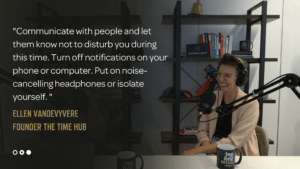
Part 2: Tooling.
Create a task management system that works for you.
The first thing you need to do is train yourself to make a note of every task you think of. You could just jot it down in a notebook, but if you want to organise your work more efficiently, a notebook won’t do. It’s enough to have a full page and turn to the next one, to forget the tasks on the previous page. That’s why Ellen recommends using a digital task management system. “The most important thing is to keep all your tasks in one place, preferably on your phone, so that you always have your task management system with you. If you have tasks on paper, tasks in your mailbox and tasks in a task manager, you’ll lose your overview and forget things.”
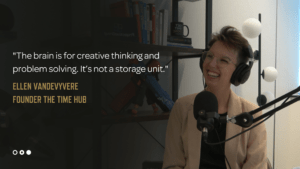
Useful tools
There are lots of different task management tools available, but please note that not one of them will do exactly what you need because everyone’s brain works a little differently. Here are a few tools that Ellen finds useful:
- Asana
- Notion
- Microsoft To Do
- The Reminder app on your phone
5 tips for efficient task management
1. Create at least 2 levels of hierarchy.
Ellen: “At the top level you define your projects, and below that you can specify your tasks for that project. The brain likes to work in a certain context. It doesn’t like it when you do a task for the podcast, and then work on another project, and then yet another project. Grouping your tasks is a good place to start.”
2. Make sure to include recurring tasks.
Ellen: “These are tasks that we have to do regularly, but we often forget. Things like filling in your weekly timesheet or taking out the bins. Being able to add recurring tasks makes your task manager more effective.”
3. Add additional information to your tasks.
Ellen: “I find it helpful to add some extra information to my tasks. For example: this is a phone call, this is an email, this is an errand. This way you can sort and filter your tasks and keep them in context, just like your brain likes to do.”
4. Start before there’s a problem.
Ellen: “It’s much harder to regain control of your schedule once you’ve lost the overview. That’s why it’s best to start building these good habits while things are still manageable. So even if you don’t have a time management problem now, it’s a good idea to start organising your task manager for when things get busier.”
5. Your mailbox is not a task manager or a filing cabinet.
Ellen: “One of the most common mistakes people make is to flag an e-mail if there’s a task in it or if there’s something else they need to do. It’s not an efficient way to keep track of your to-do’s, especially if you’re also using another task management system. Good inbox hygiene is helpful, even at the start of your career.”
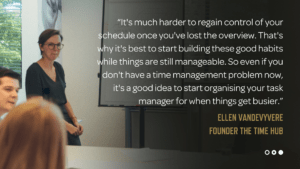
Part 3: Procrastination.
“Why do we procrastinate? Because our brains are constantly seeking pleasure. If you give your brain a choice between doing something that’s boring or difficult, or doing something that gives you instant gratification, it will choose the latter. Let’s say you’ve got a big project to work on Wednesday morning. There’s a good chance that on Wednesday morning you’ll open your mailbox and start answering emails because it’s a lot easier than tackling that big, complex project.”
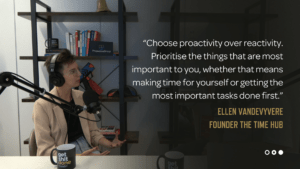
The motivation of the looming deadline.
Some people need to be a little too close to a deadline before they start working on a task. For Ellen, this isn’t necessarily a problem. “I always ask the same question: does the deadline give you a dose of healthy or unhealthy stress? If it’s unhealthy stress, then we definitely need to look at ways to combat your procrastination, like setting artificial deadlines or building in accountability. But if it’s giving you a healthy dose of stress, then I don’t see why you need to change that.”
3 ways to stop procrastinating
There are three reasons why we procrastinate: because a task boring and we don’t want to do it, because a task is overwhelming and we don’t know where to start, or because we are perfectionists. “This is an underestimated reason for procrastination,” Ellen explains. “We want to do a good job. We want to do it so well that we don’t start, because we don’t feel we can find the time to do it well.” Here are some things you can do to get started:
1. If it’s boring, play around with it.
Ellen: “I’m a notorious procrastinator when it comes to invoicing, which isn’t a very good idea when you’re self-employed. I fixed that by planning a Finance Date with myself once a month. The name alone makes it more fun. I go to a coffee shop, order a large coffee and a nice piece of cake, put on some good music and send out my invoices. It may take me longer, but I’m doing it and it doesn’t seem so heavy.”
2. The 5 minute rule.
Ellen: “The 5 minute rule is a way of tricking the brain. You say to yourself: I’m going to set a timer for 5 minutes and all I have to do is start this task. If after 5 minutes I still don’t want to do it, I can stop. The thing is, 90% of the time you’ll keep going. Getting started is the hardest part.”
3. Take the first step.
Ellen: “When we’re faced with a big project, it can seem like an impossibly high staircase. What you can do is take a look at what needs to be done and ask yourself: what can I do today to make a start? That’s it. You don’t have to get to the top of the staircase, you just have to get to the first step.”
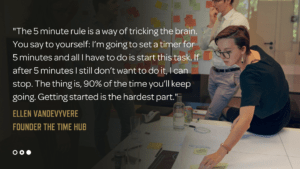
The ultimate tip.
“If there’s one thing you should take away from this podcast, it’s this: choose proactivity over reactivity,” Ellen concludes. “There are so many stimuli coming at us every day. To be productive and stay calm, you need to prioritise the things that matter most to you. For example, take some time for yourself in the morning. When you start work, do the things that absolutely have to be done first. Then do the reactive tasks, such as answering emails or communicating with colleagues. This is one of the most important guidelines for me.”
Listen to the entire episode down below.
About Exellys
Exellys is a Talent Incubator. We match ambitious companies with the finest talent. Are you ready to drive the innovations of tomorrow? Ready to make an impact and become a future-fit digital leader?
Whether you are a graduate or (young) professional, Exellys will unlock your full potential by guiding you to a challenging work environment that perfectly matches your personality, expectations and ambitions.
On top of that, you are enrolled in one of our very own training and coaching programs (based on your personal and professional ambition and experience). This means that, while working as an Exellys consultant, we are helping you to bridge your ambition to excellence.
Through intensive training and coaching, you’ll gain the essential skills, competencies and knowledge necessary to become the highly effective professional you aim to be. Become an Exellyst and get in touch with us today!
Tags: career , Exellys Talks , podcast , productivity